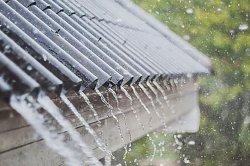EPA Awards $75,000 Grant to Montclair State for Stormwater Management Project
The grant will fund a project to remove contaminants from urban stormwater at the source, which will shorten water treatment time and make the process of providing clean and safe water more efficient.
Posted in: Uncategorized

These students are applying what they have learned in the classroom to create innovative solutions to environmental challenges. These awards support the next generation of scientists and engineers in their commitment to environmental protection, while helping states, tribes, and local communities find solutions to their environmental issues.
These P3 students are tackling some of our most pressing and complex environmental issues. The innovative research funded today will help us better protect human health and the environment.
Montclair State University has long been a leader in New Jersey in the field of environmental science, management and sustainability research. This grant will enable our students and faculty to further the work being done to improve the water quality of urban environments, using recycled municipal solid wastes as new adsorbents for removing heavy metal contaminants — such as lead and nutrient phosphorous — from stormwater at its source. We are grateful to the Environmental Protection Agency for recognizing the value of our students’ work and the impact it will have on providing clean water in cities across the United States.
Background
The P3 program is a two-phase research grants program that challenges students to research, develop, and design innovative projects addressing environmental and public health challenges. Phase I serves as a “proof of concept,” where teams are awarded a $15,000 grant to develop their idea and showcase their research in the spring at EPA’s National Sustainable Design Expo. These teams are then eligible to compete for a Phase II grant of up to $75,000 to implement their design in a real-world setting.
Past P3 winners have gone on to start businesses based on ideas and products developed through their P3 project. For example, a 2007 P3 winning team from University of California Berkeley went on to create SimpleWater, a water treatment company that specializes in household water treatment systems. Another successful 2007 P3 team from the University of Virginia created the Learning Barge, as a part of the Elizabeth River Project. The Learning Barge is the world’s first floating wetland classroom and America’s Greenest Vessel. It’s a “steward ship,” teaching children that live nearby about environmental stewardship and how to make the river swimmable and fishable by 2020.
